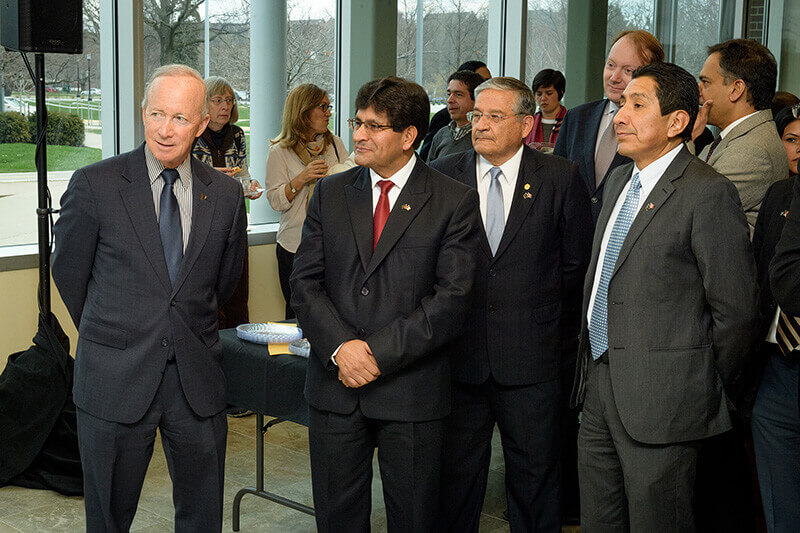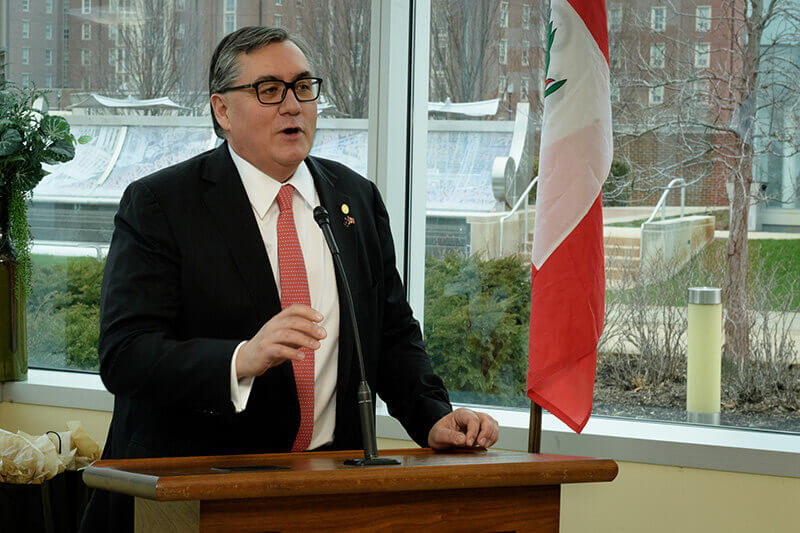April 9, 2018
Purdue, Peruvian university kick off research and innovation alliance

From left, Purdue President Mitch Daniels, Rohel Sánchez Sánchez, rector (president) of UNSA, Horacio Barrera Tamayo, vice chancellor for research of UNSA, and Victor Maqque, postdoctoral research assistant, Department of History and the Native American Educational and Cultural Center, share in the excitement of the Purdue-Peru partnership. (Purdue University photo/John Underwood)
WEST LAFAYETTE, Ind. — Purdue University celebrated the official start of its new Cooperative Technical Alliance Program with the Universidad Nacional de San Agustin (UNSA) with the launch of its initial flagship research and capacity building initiative: the Arequipa Nexus Institute for Food, Water, Energy, and the Environment. The celebration took place Monday (April 9) at Purdue.
“Purdue is a leader in developing holistic approaches to global sustainability grand challenges based on partnerships,” said Tomás Díaz De La Rubia, chief scientist and executive director of Purdue’s Discovery Park. “Through a close collaboration with our partners at UNSA, Discovery Park can bring the full power of its unique interdisciplinary approach to improve the lives of the citizens of Arequipa through the application of our leading-edge expertise to the regional sustainable development challenges. The partnership represents a new paradigm in the development and application of scientific and socio-economic approaches to global sustainability grand challenges, and we fully expect to expand this new paradigm to new relationships in other regions of Peru and Latin America in the future.”
The Nexus Institute represents a vision for a collaborative and vibrant research, education and innovation ecosystem where transformative solutions to challenges faced by Arequipa, Peru, and Latin America are explored. It aims to understand the region’s food, energy and water production and delivery systems in the context of the complex socio-economic-environmental challenges Arequipa faces such as a changing climate, diminishing resources, a legacy of environmental degradation and diverse communities striving for prosperity and security.
The tools and perspectives applied will strive to produce a culture of next-generation sustainability thinking, not just within Peru, but in all developing economies. In these regions, agriculture, energy, buildings, waste and water resource sectors are being reengineered to be constructively-linked with synergistic material flows that minimize waste or tradeoffs in environmental or social quality.
“We are thrilled to have found a strategic partner in Purdue and Discovery Park, whose mission and themes dovetail seamlessly with the vision of UNSA,” said Rohel Sánchez Sánchez, rector (president) of UNSA. “The new alliance will draw on Purdue’s unique expertise, which will foster innovation, solutions and economic prosperity locally and regionally.”
 Tomás Díaz De La Rubia, chief scientist and executive director of Purdue’s Discovery Park, discusses the Peru partnership on Monday (April 9). (Purdue University photo/John Underwood)
Download image
Tomás Díaz De La Rubia, chief scientist and executive director of Purdue’s Discovery Park, discusses the Peru partnership on Monday (April 9). (Purdue University photo/John Underwood)
Download image
Purdue’s Center for the Environment (C4E) in Discovery Park will be the administrative and collaborative link to UNSA in establishing the Nexus Institute in Arequipa. Timothy Filley, professor of geochemistry and soil science at Purdue and acting director of C4E, will co-direct the Nexus Institute’s scientific programs and partnerships together with his counterpart at UNSA, Henry Gustavo Cornejo Polanco, professor and dean of its School of Process Engineering.
“The vision for the institute and this first phase of research support is more than a collection of research and capacity building projects, but a deeply intentional research network for addressing past, present and future linked socio-economic and environmental challenges,” Filley said. “It is born out of the core principle of Purdue’s Discovery Park and Center for the Environment that science-based decision-making is essential to a sustainable and profitable future.”
Initially, the focus of the partnership will be on the development of research infrastructure and interdisciplinary projects that integrate the social and physical sciences to address challenges in food security and safety, water quality, energy efficiency and soil health.
The first phase of funding will allow more than 25 UNSA faculty to collaborate with 35 Purdue faculty and staff, including 12 post-doctoral researchers, representing 17 departments and six colleges at Purdue.
Project topics vary broadly, including developing a decision-making framework for sustainable water management; identifying and mapping soil impairments and improving soil health; strengthening Arequipa’s grape and wine industry through advancements in sustainable agriculture; designing net-zero energy buildings; and creating robotic water quality monitoring and distribution systems.
In addition, plans are underway to create a Nexus Institute building in the Majes agricultural valley of Arequipa to house these research activities. It will be equipped with state-of-the-art instrumentation, conference facilities and residential quarters for visiting scientists.
Purdue became involved with UNSA after signing an agreement with the Core Foundation in 2016 agreeing to explore opportunities to provide solutions and economic innovations to help developing communities, especially those in Latin America. Core Foundation is a private nonprofit organization that focuses on economic development through science, technology and innovation coupled with investments in prevention and resolution of social conflicts. The foundation represents 15 universities in Peru with the mission of promoting economic development through strategic partnerships between universities, government and private companies in North and South America.
The UNSA alliance is the latest example of Purdue’s growing international impact with programs already in place in Africa, Colombia, India, China and Ireland. The goal of the partnership is to make UNSA the premier location in Latin America for cutting-edge environmental sustainability research and innovation.
About Discovery Park
Discovery Park is a place where Purdue researchers move beyond traditional boundaries, collaborating across disciplines and with policymakers and business leaders to create solutions for a better world. Grand challenges of global health, global conflict and security, and those that lie at the nexus of sustainable energy, world food supply, water and the environment are the focus of researchers in Discovery Park. The translation of discovery to impact is integrated into the fabric of Discovery Park through entrepreneurship programs and partnerships.
About the Center for the Environment
The mission of the Center for the Environment (C4E) in Discovery Park is to promote proactive, interdisciplinary research, learning, and engagement at Purdue, addressing important environmental challenges. C4E works with global partners to conduct use-inspired science to address humanity’s most pressing environmental and sustainability challenges.
About Universidad Nacional de San Agustin
The National University of San Agustín de Arequipa (UNSA) was founded on Nov. 11, 1828, as a public university. Its mission is to train high-quality professionals to be competitive, capable of being agents of change and development in society, and excellent researchers. Additionally, its mission is to solve problems that impact the environment of the region and the country of Peru, where UNSA is located.
Media Contact: Kayla Zacharias, 765-494-9318, kzachar@purdue.edu
Sources: Timothy Filley, 765-494-6581, filley@purdue.edu
Tomás Díaz De La Rubia, 765-496-6625, tddlr@purdue.edu

